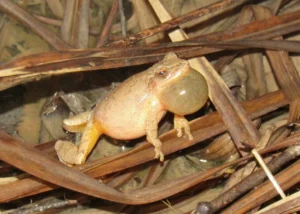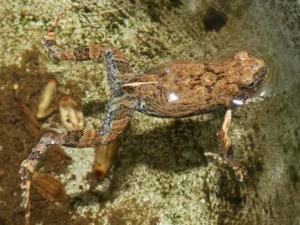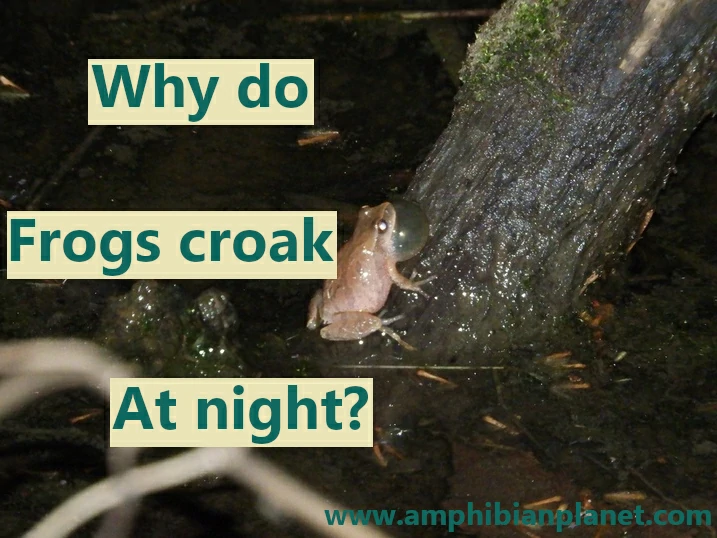Croaking is one of the most common noises frogs make. On warm spring and summer nights, it’s common to hear the croaking of hundreds of hidden frogs – coming from ponds, and other bodies of freshwater nearby.
Frogs croak at night to attract females of the same species to mate with. The loud croaking is typically from male frogs – females move towards calling males, and pick the male that they prefer based on their calls. The croaking intensifies at night due to cooler temperatures, higher humidity, and fewer predators.
Frogs will be more active and will croak more at night when the temperatures are warm enough, and there is sufficient moisture in the air to stimulate their breeding instincts. This is usually during the wet season, or after a warm summer rain.
The darkness of the night means frogs are less vulnerable to predators such as birds that are more active during the day. Frogs also blend into their environments easier to hide and avoid active predators in the cover that the darkness provides.
How Frogs Croak
Frogs have simple vocal cords that have two slits in the bottom of the mouth. They also have a vocal sac that can amplify the vibrations from the vocal cords.
When air passes from the lungs through the vocal cords, a sound is produced. The inflating and deflating vocal sac makes the sound louder or quieter.

When a frog croaks, the throat or sides of the mouth will expand, but its mouth won’t open. Sometimes, it may look like the frog is staring off while making the sound.
Every frog species has a sound that is unique to their species – and the croaks of some species can be heard over a mile away!
Male Frogs Croak at Night to Attract the Attention of Females
Frogs are nocturnal creatures and are generally more active at night. The conditions at night provide the perfect environment for male frogs to croak to attract a female with whom to mate.
Males usually call from ponds, swamps, streams, and other possible breeding sites. Each frog species has a different call and female frogs will only be attracted to the call of their own species.
When females are ready to mate, they will move towards calling males, and pick the male that they prefer.
In some frog species such as the barking tree frog, most females will mate with the male closest to them. This is especially more likely when the distance to other calling males is large.
However, in many species, females can be much more selective. Some species prefer males who make their calls longer and more frequent – and other species prefer males who call next to a pre-made nest.
The Females of Some Frog Species Can “Filter Out” the Calls of Males From Other Species
It’s common for males of so many different frog species to call from the same pond, trying to attract potential mates. Homing in on the right males can be a challenge for female frogs.
However, research has shown that the females of some frog species such as the American green tree frog, can make their eardrums less sensitive to the croaks of other species. They do this by simply inflating their lungs.
The extra vibrations of the lungs cancel out sounds of the same frequency at the eardrum, reducing sensitivity.
This decrease in sensitivity falls just between the two most prominent frequencies of a male green tree frog’s croak, so it does not affect the female’s ability to hear her own species.
Frogs Are Less Vulnerable to Predators at Night
Frogs feel more comfortable at night because they’re not as easily visible to potential predators. Many of the animals that prey on frogs are less active at night, making it safer for frogs to come out and croak to attract mates.
For example, many predatory bird species such as hawks, and eagles are strictly diurnal, meaning they don’t hunt at night.
This allows frogs to come out more into the open without the fear of being eaten by hawks, and many other predators.
Frogs Croak at Night Because the Temperatures Are Cooler
Frogs are ectothermic (cold-blooded) animals, which means they cannot regulate their body temperature. Their body temperature changes with that of their surroundings.
When it’s warm, their bodies soak up the heat, and their body temperature rises. When it’s cooler, their body temperature falls.
In other words, they depend on their environment to keep them comfortably cool or warm.
As the temperature changes at different times of day, they move around in their environment to regulate their body temperature.
When their body temperature is low, they move into the sun to warm up, when it is high, they move to the shade or cool water to cool down.
Night temperatures are usually cooler because the sun is not out at night. The ground cools because it emits more radiation than it gains from the atmosphere.
This means frogs can come out and be more active without the fear of overheating. The cool night weather is perfect for them to croak and look for mates.
Frogs Croak at Night Because the Air Is More Humid
Frogs love cool, humid environments. They usually hang around shaded areas near ponds, swamps, streams, lakes, and other water bodies – where they can cool down and keep their skin moist.
Relative humidity increases at night due to the drop in temperature, so frogs can come out without worrying about their skin drying out.
In simple terms, the air is like a sponge. When air temperature increases, the air capacity increases, so the air can hold more water vapor.
However, as the air temperature drops, the air capacity decreases, so the air can hold less vapor. This leads to an increase in relative humidity.
Male Frogs Croak to Defend Their Territory
In the breeding season, male frogs often form temporary territories to attract females, which they defend from other males. These territories usually occupy the immediate area around an individual.
Breeding male frogs will defend the boundaries of their territories, and scare off intruders by using a variety of calls. Some frogs will even fight intruding males.
Research has shown that male frogs of many species can tell the difference between their established neighbors, and unfamiliar strangers. This helps them avoid aggressive encounters with male frogs that hold territory nearby.
Sometimes, Predators seek out Croaking Frogs
When frogs croak, female frogs are not the only ones listening – many predators are also drawn to the calls.
For example, Túngara frogs, found in Middle, Central, and South America, are often preyed on by bats which locate them by homing in on their mating calls.

In addition, flies called midges, find their way to Túngara frogs by “intercepting” their mating calls. Midges feed on the blood of the frogs but also carry diseases and parasites, which they frequently transmit to frogs.
To avoid predation, the males of some frog species, such as the American green tree frog, will choose to remain silent when looking for mates (these are called ‘satellites’).
Instead, these frogs will intercept the calls of nearby males, and mate with approaching females. This is known as “sexual parasitism“.
Doing this enables satellite males to conserve energy, and avoid attracting the attention of predators.
When Do Frogs Stop Croaking at Night?
Frogs croak to attract mates, so they will usually stop croaking at night when their breeding season ends. During the breeding season, they stop croaking or reduce the frequency of their croaking at sunrise.
They will also stop croaking on spring nights when the weather is harsh, or when they see a predator around. If you ever take time, to approach an area where you hear a croaking frog, you will probably notice that the frog stops croaking when you get closer.
Frogs spend most of the year hibernating and are only active when the weather is warm, and wet, creating a conducive environment for them to breed. You won’t hear any croaking frogs on cold winter nights, or hot, dry nights in the summer.
10 Tips to Keep Frogs Out of Your Yard
Frogs croaking away all night can be very noisy and annoying, especially if they are very close to your house.
There are a few things you can do to make your yard less attractive to frogs, and to encourage the ones already living on your property to find a new home.
Here are several things you can do to keep frogs off your yard.
1. Cover Swimming Pools
Being amphibians, frogs are attracted to areas with water bodies where they can swim. It is important to cover your swimming pool when it is not in use. This will help discourage frogs from coming onto your property.
It will also protect the frogs as chlorine from the pool water can be very harmful or even lethal to them.
2. Consider Building a Small Fence Around Ponds in Your Yard
Unlike swimming pools, ponds housing fish and live plants need direct sunlight. This means they can not be covered up as swimming pools can.
Instead, you could try building a small fence around your ponds – that frogs cannot climb or hop over.
3. Raise Your Birdbaths and Keep Them Farther Away From Your Home
Bird baths close to the ground provide an excellent source of water for frogs to soak in.
If possible, raise your birdbaths to make them less accessible to frogs. Also, keep them farther away from your home.
4. Keep Your Grass Short
Tall grass provides the perfect cover for frogs and other amphibians to hide from predators. It also attracts bugs such as grasshoppers and other frog food. Keeping your grass short will discourage frogs from coming into your yard.
It will also make it easy to spot the frogs that do end up in your yard so you can get rid of them.
5. Clear Dead Leaves and Other dead Vegetation
Frogs love to hide under dead logs and leaf litter on the ground. Getting rid of these will keep frogs away because they will have fewer places to hide.
6. Don’t Overwater Your Lawn
Frogs are amphibians that love moist environments where their skin won’t dry out. For this reason, over-watering your lawn will attract frogs to your yard.
Also, it will make the grass grow faster which means it will need to be mowed more often.
7. Use a Raised Water Bowl for Your Pets
If you have dogs, cats, or any other pets at home that spend lots of time outdoors, it’s a good idea to use a raised water bowl. This is to prevent frogs from easily accessing or getting into the water.
Also, remember to change the water every day so your pets do not get poisoned by any frogs or toads that do get into the water (pets can ingest frog or toad toxins by drinking water the amphibian soaked in).
8. Consider Installing a Fence
If you have an open yard in an area with lots of amphibians, inevitably, a few frogs will eventually end up on your property.
Install a fence and put a mesh screen around the outside of your fence. Bury the screen by at least 10cm and extend it by at least 50cm. This will help stop any frogs trying to come into your yard.
Some companies even make wildlife-specific fencing. You could easily find a “frog-proof fence” appropriate for your yard.
9. Be Vigilant During the Wetter Seasons of the Year
Frogs and other amphibians are most active in the wetter months when the temperatures are warm. Be alert during this time of the year and watch for any frogs that may end up in your yard.
Be extra alert in the very early morning hours, after dark, or after a rainstorm when amphibians are more likely to be active.
10. Fill Out Low-Lying Areas in Your Yard
After a rainstorm, take note of where puddles form in your yard. Use dirt or soil to fill these low-lying areas out.
All of the things mentioned above are just a few things that you should consider doing to keep frogs away from your yard.
Above all, you need to make sure that you inspect the yard consistently to get rid of any frogs that might be hiding or wandering about.
Photo credit: Gray Catanzaro (CC BY-NC 4.0)

